#these aren't poems but they aren't essays
Explore tagged Tumblr posts
Text
how can one live in a world that rejects life that's put into it, that is in a constant battle against it'self, waring against the life so many desire and claim to love, if the world was one of love, why are people still born, forget bloodlines, forget legacy, the world must be stoked and loved it'self before more life can be brought into it, it must be tended to and loved and trimmed and preened, until life florishes and accepts the life put into it.
#these aren't poems but they aren't essays#like a soliloquy i guess#because i enjoy poem formatting but fuck poems#it takes too long to write and carefully think out a poem.#soliloquys are the poor man's poetry for real#halbling
0 notes
Text
All the ideas.
All the motivation.
But also all of the headaches.
And none of the energy.
Or time.
;-;
#a poem#by me#but actually I swear I have added so many notes and outlines to my files these past few days#but don't actually sit down to write any of them because I'm constantly tired#or get a headache#and have essay deadlines#it sucks#but well#once it lets up a little bit#I have outlines started for the next chapters of a few things#and finished for one#fic: Dreaming of Home#fic: A Little Left of Right#fic: Champions Aren't Born#secret TF:One fic#fic: Numb Little Bug
3 notes
·
View notes
Text
The weird thing about being a writer, especially a writer focused on memior and essay, is that if you find a collection of your old stuff, you can basically shake hands with a version of yourself that you forgot existed.
They make strange word choices and reference jokes anchored in cultural context.
You have the same memories, but the details are different, and your understanding of them has changed.
Anxieties and conflicts that once were the main focus of your writing may no longer haunt you. Perhaps you've resolved those issues. Or maybe they've gotten worse.
People you once wrote about with affection have succumbed to new character analysis. Or an annoying character has disappeared since you wrote about them, and you cringe reading what you thought.
For me, the weirdest part is seeing my imposter syndrome tangled up in so many things I wrote. Now, looking back at these pieces written by a person who feels unfamiliar now, I think Wow, this is so good, why did I ever think I was bad at writing then? If only I could grasp the irony that I think everything I create now is inadequate too.
That and I found some typos.
#just more stream-of-consciousness observations#I hope these aren't too annoying#kind of a journal?#journaling#about writing#writing#microessay#I was reading my essays and poems from 2012-2017
6 notes
·
View notes
Text
I'm at over 30, and the only reason why is because I discovered audiobooks, which I can listen to even when I'm completely stuck with vertigo and need to keep my eyes shut. Thank you to all authors and narrators and people who make audiobooks accessible to the world <3 Here's a few: Mistborn, Stormlight Archive, and Frugal Wizard's Handbook - so much love there, but also some big mixed feelings about some of the themes
The Binti Trilogy - I love these books so much. I love my protective and murderous alien jellyfish Okwu <3
The Count of Monte Cristo - <3 <3 <3 <3 <3
Future Home of the Living God - !!!!!! oh my this book is stunnnnnning
The Immortal Soul Salvage Yard - (mental illness + poetry = <3)
Legendborn and almost all of Bloodmarked - I love Legendborn, I felt frustrated with Bloodmarked, it'll be interesting to see how the third goes
Wild New World - our dwindling biodiversity :'(
Howl's Moving Castle - !!!!! <3 <3 <3
A Snake Falls To Earth - so so so so sweet and beautiful
The Changling - AHHHHH. The kind of book I read and think, I could never write anything so beautiful but I'm so glad to have read it. Also haunting.
Twilight Territory - This book. It broke my heart. It was beautiful. I recommend it ten thousand times.
The Black Count - about Alexandre Dumas' father, Alex Dumas. This book is so good. It adds so much pathos to the Count of Monte Cristo, and just has so much compelling story and history in its own right.
Wings of Fire books - geared towards children in a way that everyone can love. I love them. They're lovely.
Also now reading the Realm of the Elderlings and it is my newest bestest comfort tragic heartthrob.
And no. Long fanfics don't count as books!
#have also read lots of fanfics I love and adore#listened to a few too#but this list ignores articles/fanfics/essays/poems that aren't bookified#perhaps for another day!!#vertigo disorder#boo for being bedbound#yay for audiobooks that make everything better <3
5K notes
·
View notes
Text
things that have been told to me by people related to my course is what they've used chatgpt on:
a multilingual person who graduated my course inserted the opening lines of a poem multiple times in one language in order for it to translate into english in "different ways" and then chose the "bits" that worked the best and spliced them together into a preferred translation, rather than doing the translation from scratch (this person speaks both of these languages fluently)
a phd who is also one of my professors using it to spit out potential themes/sub-themes for their main essay focus
me: babes. those are the critical thinking skills. the skills you're meant to be honing during your studies. the things you're meant to spend a good deal of time writing and thinking about and trying out different versions of. these things aren't supposed to have shortcuts because of... your brain. learning. building patterns. connections even. you're not just doing these things to spit out a finished product, why are you. at school????
pls. your brains. im begging you.
#the former gave the advice that it's simply IN the art-world now so we have to learn to use it as a tool#i would rather eat glass but it's chill#it's chill that this is advice being given on masters and phd degrees#truly everything that im good at is considered increasingly irrelevant by the world as a skillset#while being increasingly relevant because peoples brains are melting
69 notes
·
View notes
Note
Hello hi hello! Do you have any favorite poems, or works of art that involve words and aren't traditional longform works (books/collections of essays/etc?) (I am being vague about it because many arts out there and you have the vibe of someone who might be fond of an unconventional one)
please read nikki giovanni and pablo neruda and ada limón
also anni albers' on weaving
and jenny holzer's art
95 notes
·
View notes
Text

A MASTERLIST OF ALL THE BOOKS I COULD FIND IN TIM'S BOOKSHELVES
As someone who basically sees Tim Laughlin as my own version of Jesus Christ (I kind of wish I was lying but I have a 'beyond measure' tattoo branding my skin so perhaps I'm entirely serious), I simply needed to know what was on those shelves of his. And this was a hard task to achieve, believe me... but I got much farther than I initially thought I would.
(I've got so much to say about all of these books and how they might string together to create a deeper understanding of Tim as a character but I won't go into it here... maybe in a future post or video essay, who knows).
If you wish to help a girl out and attempt to figure out any of the other books I simply can not crack no matter how I look at the screenshots and mess with the adjustments... here's a folder full of 2k sized screenshots of those shelves.
Before I list the books one by one, I want to make a couple observations:
1) Almost all of the books I was able to pinpoint are non-fiction. The ones that aren't are children's books.
2) Topically, we see an interdisciplinary interest in:
History: from a book on a king in 4BC, to a survey of landholding in England in the 11th century.
Somewhat current historical events: books on World War I and II.
Western Philosophers: specially from the 16th to the 18th century.
Aesthetics: there's at least 2 books on the subject matter, but I couldn't find the second one, sadly.
Spirituality: not only christian/catholic; some of these books touch on Eastern practices such as Buddhism and Hinduism.
Fairy tales / children's books.
Psychology: specially in regards to mysticism and sexuality.
Science and scientific discovery/research.
3) A lot of the history, current events, and spirituality books are autobiographies/memoirs.
4) A lot of books (specially those on sciences and philosophy) tend to be more so anthologies or overviews on a subject matter rather than a book written by one specific author on one very concrete topic.
Overall, this all reflects very well an idea Jonathan Bailey himself expressed in a brilliant interview you can watch here if you haven't yet:
"Tim has buddhist flags in his 1980s flat in San Francisco, he has crystals, he is someone who is always seeking other ways to understand human experience. Which is probably tiring for him. Throughout the decades, he sort of appears as completely different people. At the crux of it there's this extreme grinding, contrasting, aggressive duality between feeling lovable and not feeling lovable. There's such shame in Tim. But it's the push and the pull which keeps him alive.”
This desire to understand human psychology, spirituality, and the ways of the universe through as many diverse lenses as possible, as well as a predilection for non-fiction, expresses very much to me that insatiable thirst for truth that defines his character so strongly.
OKAY, THAT BEING SAID. Here's the list in chronological order of publication.
PS. if you decided to click on any of the following titles it'd definitely not take you to a google drive link of the pdf file where you could download and read these books for yourself. Because that would be illegal and wrong.

Journeys through Bookland by Charles H. Sylvester (1901?) (1922 Edition)
I don't know which specific volume he owns, sorry, I tried my best but the number is not discernible (hell, the title barely is). If anyone wants the download link to these hmu because I'm not about to individually download all 10 right now.
10 volumes of poems, myths, Bible stories, fairy tales, and excerpts from children's novels, as well as a guide to the series. It has been lauded as ‘a new and original plan for reading, applied to the world’s best literature for children.’
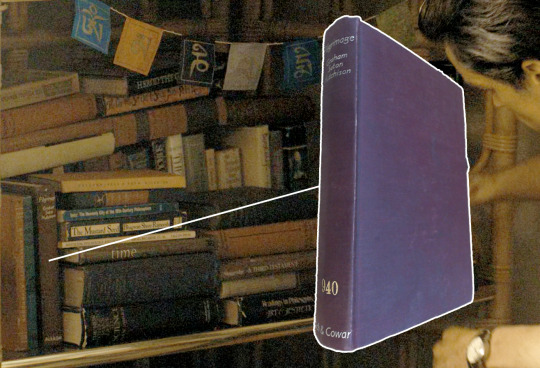
Pilgrimage by Graham Seton Hutchison (1936)
This book provides a view of the battlefields of WW I through the eyes of the average fighting man.
One curious thing about this book is that it's author, a British First World War army officer and military theorist, went on to become a fascist activist later in his life. Straight from Wikipedia:
"Seton Hutchison became a celebrated figure in military circles for his tactical innovations during the First World War but would later become associated with a series of fringe fascist movements which failed to capture much support even by the standards of the far right in Britain in the interbellum period." He made a contribution to First World War fiction with his espionage novel, The W Plan."
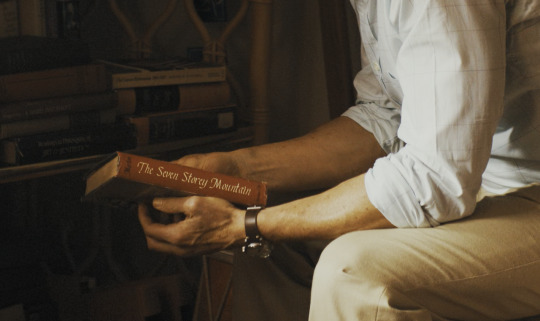
The Seven Storey Mountain by Thomas Merton (1948)
The Seven Storey Mountain tells of the growing restlessness of a brilliant and passionate young man, who at the age of twenty-six, takes vows in one of the most demanding Catholic orders—the Trappist monks. At the Abbey of Gethsemani, "the four walls of my new freedom," Thomas Merton struggles to withdraw from the world, but only after he has fully immersed himself in it. At the abbey, he wrote this extraordinary testament, a unique spiritual autobiography that has been recognized as one of the most influential religious works of our time. Translated into more than twenty languages, it has touched millions of lives.
This book requires no introduction. It's the one he keeps the Fire Island's postcard in and the one we see him re-reading in episode 8 after Hawk brings it to the hospital with him at the end of episode 7.
Just a little detail I noticed:
Apparently he liked the book so much he visited Gethsemani, which was the home of its author all the way up till 1968.

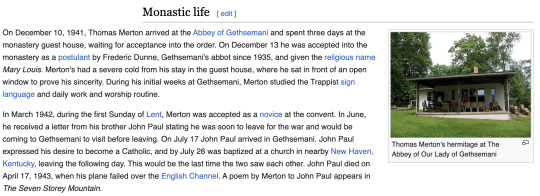
For all we know, he might have even met its author!

Sexual Behavior in the Human Male by Alfred Charles Kinsey, Wardell B. Pomeroy (1948)
When published in 1948 this volume encountered a storm of condemnation and acclaim. It is, however, a milestone on the path toward a scientific approach to the understanding of human sexual behavior. Dr. Alfred C. Kinsey and his fellow researchers sought to accumulate an objective body of facts regarding sex. They employed first hand interviews to gather this data. This volume is based upon histories of approximately 5,300 males which were collected during a fifteen year period. This text describes the methodology, sampling, coding, interviewing, statistical analyses, and then examines factors and sources of sexual outlet.
Yes, Charles Kinsey is indeed behind the Kinsey scale that has done so much for the LGBTQ+ community.

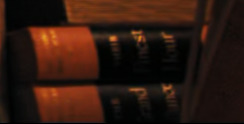
Their Finest Hour (1949), The Grand Alliance (1950), and Closing the Ring (1951) by Winston Churchill
Winston Churchill's six-volume history of the cataclysm that swept the world remains the definitive history of the Second World War. Lucid, dramatic, remarkable both for its breadth and sweep and for its sense of personal involvement, it is universally acknowledged as a magnificent reconstruction and is an enduring, compelling work that led to his being awarded the Nobel Prize for literature in 1953.
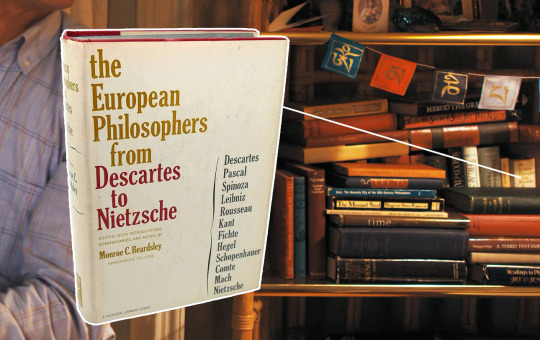
The European Philosophers from Descartes to Nietzsche by Monroe C. Beardsley (1960)
In so far as we reflect upon ourselves and our world, and what we are doing in it, says the editor of this anthology, we are all philosophers. And therefore we are very much concerned with what the twelve men represented in this book--the major philosophers on the Continent of Europe--have to say to us, to help us build our own philosophy, to think things out in our own way. For the issues that we face today are partly determined by the work of thinkers of earlier generations, and no other time is more important to the development of Western thought than is the 250-year period covered by this anthology. Monroe. C. Beardsley, Professor of Philosophy at Swarthmore College, has chosen major works, or large selections from them, by each man, with supplementary passages to amplify or clarify important points. These include: Descartes - Discourse on Method (Descartes), Thoughts (Pascal), The Nature of Evil (Spinoza), The Relation Between Soul and Body (Leibniz), The Social Construct (Rousseau), Critique of Pure Reason (Kant), The Vocation of Man (Fichte), Introducciton to the Philosophy of History (Hegel), The World as Will and Idea (Schopenhauer), A General View of Positivism (Comte), The Analysis of Sensations and the Relation of the Physical to the Psychical (Mach), Beyond Good and Evil (Nietzsche).
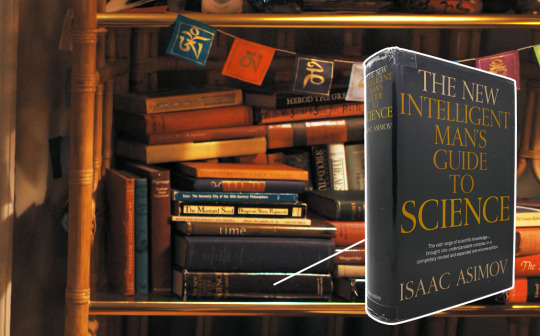
The New Intelligent Man's Guide to Science by Isaac Asimov (1965)
Asimov tells the stories behind the science: the men and women who made the important discoveries and how they did it. Ranging from Galilei, Achimedes, Newton and Einstein, he takes the most complex concepts and explains it in such a way that a first-time reader on the subject feels confident on his/her understanding. Assists today's readers in keeping abreast of all recent discoveries and advances in physics, the biological sciences, astronomy, computer technology, artificial intelligence, robotics, and other sciences.
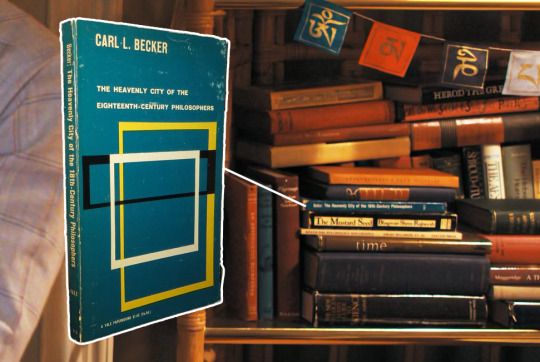
The Heavenly City of the 18th Philosophers by Carl L. Becker (1932) (1962 reprint)
Here a distinguished American historian challenges the belief that the eighteenth century was essentially modern in its temper. In crystalline prose Carl Becker demonstrates that the period commonly described as the Age of Reason was, in fact, very far from that; that Voltaire, Hume, Diderot, and Locke were living in a medieval world, and that these philosophers “demolished the Heavenly City of St. Augustine only to rebuild it with more up-to-date materials.” In a new foreword, Johnson Kent Wright looks at the book’s continuing relevance within the context of current discussion about the Enlightenment.
I find the particular choice of adding this book very curious and on brand, since it explores the idea that philosophers of the Enlightenment very much resembled religious dogma/faith in their structure and purpose. Just... A+ of the props department to not just add any kind of book on philosophy anthology.

Herod The Great by Michael Grant (1971)
The Herod of popular tradition is the tyrannical King of Judaea who ordered the Massacre of the Innocents and died a terrible death in 4 BC as the judgment of God. But this biography paints a much more complex picture of this contemporary of Mark Antony, Cleopatra, and the Emperor Augustus. Herod devoted his life to the task of keeping the Jews prosperous and racially intact. To judge by the two disastrous Jewish rebellions that occurred within a hundred and fifty years of his death -- those the Jews called the First and Second Roman Wars -- he was not, in the long run, completely successful. For forty years Herod walked the most precarious of political tightropes. For he had to be enough of a Jew to retain control of his Jewish subjects, and enough of a pro-Roman to preserve the confidence of Rome, within whose territory his kingdom fell. For more than a quarter of a century he was one of the chief bulwarks of Augustus' empire in the east. He made Judaea a large and prosperous country. He founded cities and built public works on a scale never seen before: of these, recently excavated Masada is a spectacular example. And he did all this in spite of a continuous undercurrent of protest and underground resistance. The numerous illustrations presents portraits and coins, buildings and articles of everyday use, landscapes and fortresses, and subsequent generations' interpretations of the more famous events, actual and mythical, of Herod's career.
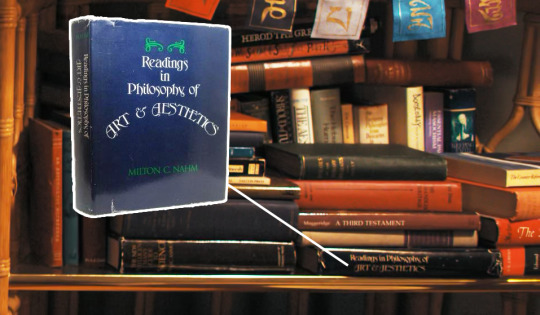
Readings in the Philosophy of Art and Aesthetics compiled by Milton Charles Nahm (1975)
A college level comprehensive anthology of essays written on the arts and the field of aesthetic philosophy.

The Mustard Seed: Discourses on the Sayings of Jesus Taken from the Gospel According to Thomas by Bhagwan Shree Rajneesh (1975)
This timely book explores the wisdom of the Gnostic Jesus, who challenges our preconceptions about the world and ourselves. Based on the Gospel of Thomas, the book recounts the missing years in Jesus’ life and his time in Egypt and India, learning from Egyptian secret societies, then Buddhist schools, then Hindu Vedanta. Each of Jesus' original sayings is the "seed" for a chapter of the book; each examines one aspect of life — birth, death, love, fear, anger, and more — counterpointed by Osho’s penetrating comments and responses to questions from his audience.
(You don't know how fulfilling it was to find some of these books and just sit there like "oh my god, yessss, he'd SO read that".)
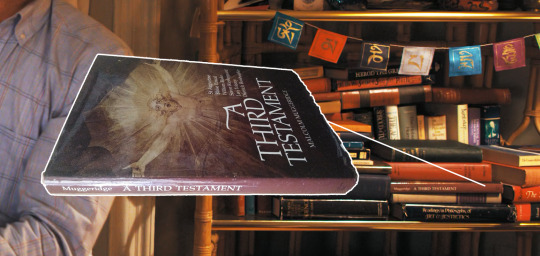
A Third Testament by Malcolm Muggeridge (1976)
A modern pilgrim explores the spiritual wanderings of Augustine, Pascal, Blake, Kierkegaard, Dostoevsky, Tolstoy, and Bonhoeffer. A Third Testament brings to life seven men whose names are familiar enough, but whose iconoclastic spiritual wanderings make for unforgettable reading. Muggeridge's concise biographies are an accessible and manageable introduction to these spiritual giants who carried on the testament to the reality of God begun in the Old and New Testaments. - St. Augustine, a headstrong young hedonist and speechwriter who turned his back on money and prestige in order to serve Christ - Blaise Pascal, a brilliant mathematician who pursued scientific knowledge but warned people against thinking they could live without God - William Blake, a magnificent artist-poet who pled passionately for the life of the spirit and warned of the blight that materialism would usher in - Soren Kierkegaard, a renegade philosopher who spent most of his life at odds with the church, and insisted that every person must find his own way to God - Fyodor Dostoevsky, a debt-ridden writer and sometime prisoner who found, in the midst of squalor and political turmoil, the still small voice of God - Leo Tolstoy, a grand old novelist who swung between idealism and depression, loneliness and fame and a duel awareness of his sinfulness and God s grace - Dietrich Bonhoeffer, a pastor whose writings and agonized involvement in a plot to kill Hitler cost him his life, but continue to inspire millions
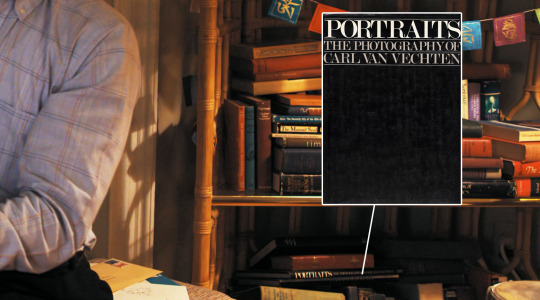
Portraits: The photography of Carl Van Vechten (1978)
Can't find a file but you can borrow it from archive.com in the link provided.
During his career as a photographer, Carl Van Vechten’s subjects, many of whom were his friends and social acquaintances, included dancers, actors, writers, artists, activists, singers, costumiers, photographers, social critics, educators, journalists, and aesthetes. [...] As a promoter of literary talent and a critic of dance, theater, and opera, Carl Van Vechten was as interested in the cultural margin as he was in the day’s most acclaimed and successful people. His diverse subjects give a sense of both Carl Van Vechten’s interests and his considerable role in defining the cultural landscape of the twentieth century; among his many sitters one finds the leading lights of the Harlem Renaissance, the premier actors and writers of the American stage, the world’s greatest opera stars and ballerinas, the most important and influential writers of the day, among many others.
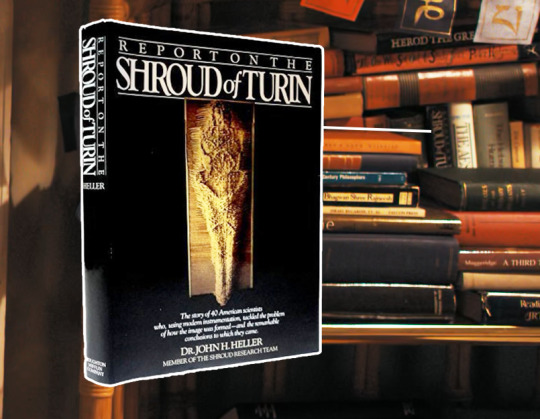
Report of the Shroud of Turin by John H Heller (1983)
Heller, while a man of science, was nevertheless a devout man (Southern Baptist). He viewed his task concerning The Shroud with great scepticism; there have been far too many hoaxes in the world of religion. The book describes in great detail the events leading up to the team's conviction that the Shroud was genuine; last - not least - being Heller and Adler's verification of "heme" (blood) and the inexplicable "burned image" of the crucified man. Although carbon dating indicates that the image is not 2000 years old and that the cloth is from the Middle Ages, there is not enough evidence to disprove Heller's assertion that the Shroud is indeed genuine.
Context for those who may not know (though I doubt it's necessary): The shroud of Turin "is a length of linen cloth that bears a faint image of the front and back of a man. It has been venerated for centuries, especially by members of the Catholic Church, as the actual burial shroud used to wrap the body of Jesus of Nazareth after his crucifixion, and upon which Jesus's bodily image is miraculously imprinted."
It is a very controversial subject matter and I definitely don't know that from going to an Opus Dei school since the day I was born till the day I graduated high school.

Mysticism, Psychology and Oedipus by Israel Regardie (1985)
I've tried my hardest but despite many Israel Regardie books being on the world wide web, I can't find a copy of this specific one.
Mysticism, Psychology and Oedipus, from the Small Gems series is one of these mysterious alchemys which Regardie and Spiegelman crafted for the serious student of mysticism. Mysticism, Psychology and Oedipus by Dr. Israel Regardie and his friend, world renowned Jungian Psychologist, J. Marvin Spiegelman, Ph.D. was created to reach the serious student at the intersecting paths of magic, mysticism and psychology. While each area of study overlaps they also maintain their own individual paths of truth. One of Regardie’s greatest gifts was his rare ability to combine these difficult and diverse subjects and make them understandable.
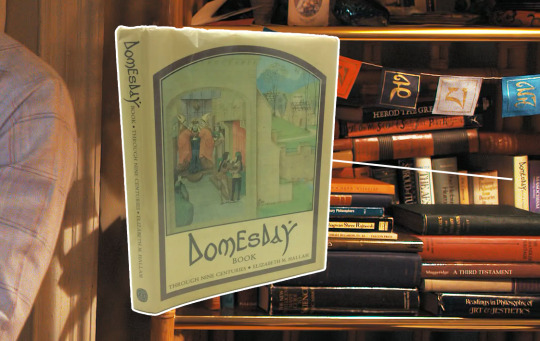
Domesday Book Through Nine Centuries by Elizabeth M. Hallam (1986)
In 1086 a great survey of landholding in England was carried out on the orders of William the Conqueror, and its results were recorded in the two volumes, which, within less than a century, were to acquire the name of Domesday, or the Book of Judgment 'because its decisions, like those of the last Judgment, are unalterable'. This detailed survey of the kingdom, unprecedented at that time in its scope, gives us an extraordinarily vivid impression of the life of the eleventh century.
The following two are a fuck up on the props department part because they were published after 1987 but we'll forgive them because they were not expecting for me to do all this to figure out the titles of these books, I'm sure:
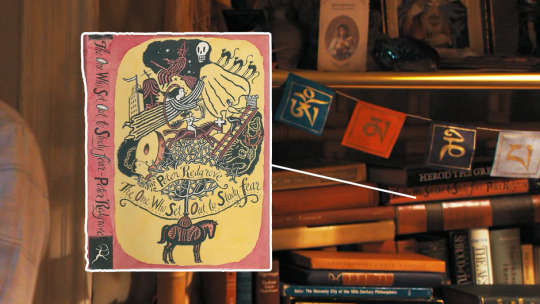
The One Who Set Out to Study Fear by Peter Redgrove (1989)
This book barely exists physically, rest assured it does not exist online... LOL.
The author of The Wise Wound presents here a re-telling of Grimm's famous fairy tales, written in a manner and spirit more suited to the present day. Each story is rooted in the original, but cast in an energetic style that is both disrespectful and humorous.
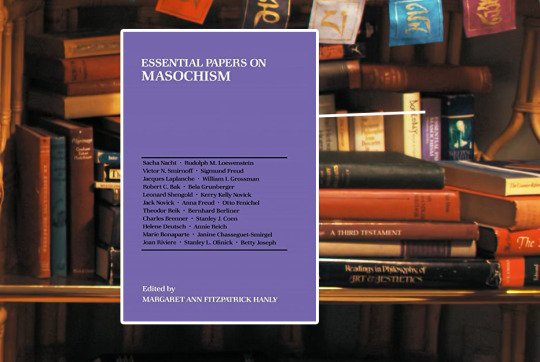
Essential Papers on Masochism by Margaret Ann Fitzpatrick Hanly (1995)
The contested psychoanalytic concept of masochism has served to open up pathways into less-explored regions of the human mind and behavior. Here, rituals of pain and sexual abusiveness prevail, and sometimes gruesome details of unconscious fantasies are constructed out of psychological pain, desperate need, and sexually excited, self- destructive violence. In this significant addition to the "Essential Papers in Psychoanalysis" series, Margaret Ann Fitzpatrick Hanly presents an anthology of the most outstanding writings in the psychoanalytic study of masochism. In bringing these essays together, Dr. Fitzpatrick Hanly expertly combines classic and contemporary theories by the most respected scholars in the field to create a varied and integrated volume. This collection features papers by S. Nacht, R. Loewenstein, Victor Smirnoff, Sigmund Freud, Jacques Laplanche, Robert Bak, Leonard Shengold, K. Novick, J. Novick, S. Coen, Margaret Brenman, Esther Menaker, S. Lorand, M. Balint, Bernhard Berliner, Charles Brenner, Helene Deutsch, Annie Reich, Marie Bonaparte, Jessica Benjamin, S.L. Olinick, Arnold Modell, Betty Joseph, and Janine Chasseguet-Smirgel.
Let's not forget another book we know has been present in his shelves at some point:

Look Homeward, Angel by Thomas Wolfe (1929)
It is Wolfe's first novel, and is considered a highly autobiographical American coming-of-age story. The character of Eugene Gant is generally believed to be a depiction of Wolfe himself. The novel briefly recounts Eugene's father's early life, but primarily covers the span of time from Eugene's birth in 1900 to his definitive departure from home at the age of 19. The setting is a fictionalization of his home town of Asheville, North Carolina, called Altamont in the novel.
And Ron Nyswaner mentioned in a podcast (might be this one? I'm not sure) that he scrapped from the script a line where Tim recommends this poem at some point:
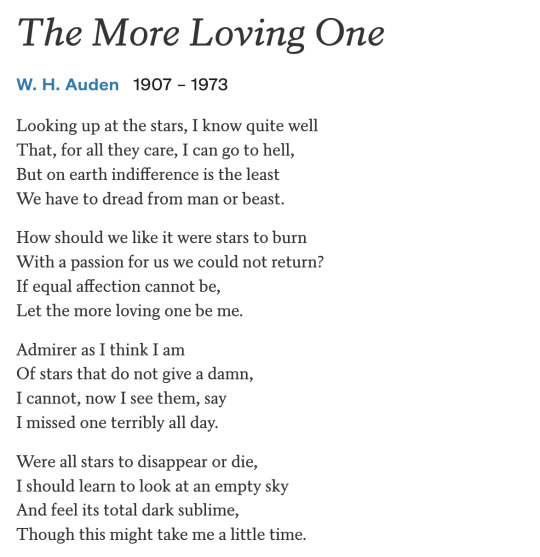
He specially emphasized the line "If equal affection cannot be, Let the more loving one be me".
And lastly, if anyone wanted to know:
His copy of the bible is the Revised Standard Version by Thomas Nelson from either 1952 or 1953.
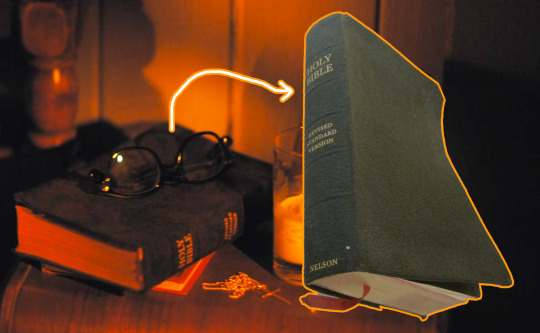
Because why the hell not figure out what specific translation of the holy bible a fictional character was basing his beliefs on — as if the set designers cared nearly as much as I do.
#fellow travelers#fellow travelers meta#tim laughlin#fellowtravelersedit#i know it doesnt precisely fit the tag but hey.. theres a gif right there#this is such a jobless thread... but i AM jobless
143 notes
·
View notes
Text
The Final February Giveaway

In honor of Black History Month I present my final giveaway of Frebruary!
3 prizes will be on the table:
A copy of the founder of the Black Girl Hockey Club R. Renee Hess' book of essays Blackness is a Gift I Can Give Her: On Race, Community, and Black Women in Hockey.
A silver outburst young gun card of one of my favorite players: Sophie Jaques.
And any four base cards from the new Upper Deck set. (which ones are up to the person that wins it)
This one will be slightly more involved than the other two though.
To enter you must:
Make a piece of art around the theme of "Celebrating Black Women in Hockey." I cannot stress this enough: It does not have to be good, but you do have to try. I'm not expecting anyone to put hours and hours of work into it, just that you clearly thought about the topic, came up with an idea, and tried to creatively express it through art. So if you aren't a great artist you need only do your best. But if I get someone submitting a drawing of a stick figure with a line pointing to it that says "Nikki Nightengale" I'm not gonna count it. [I will respect the Nightengale shoutout though]. And I'm talking any form of art! You can do a drawing of Sophie Jaques. You can do an 15 second interpretive dance of how Saroya Tinker makes you feel. You could write a little poem about being a fan of color. You could create a photo set wherein you try and recreate Sarah Nurse's walk-in fits with stuff you have around the house. You could write a little ode to the greatness of Laila Edwards. You could make a punny Mikyla Grant-Mentis valentine card. You could make an snow sculpture depicting the hope for continuing advancements of black women in hockey. You could do so many different things! You do you.
Have fun with it! This isn't about making masterpieces to hang in a museum. So there's no reason to stress. This is just about all of us getting together to have a good time and celebrate these amazing women and their accomplishments.
Post your art here on Tumblr so we can all enjoy it! Just be sure that I can see it. So be sure to tag me in it so I can be sure to see it.
And that's it!
Additionally for every entry that I get I will make a donation to the BGHC! So even if you don't want anything, submitting a piece anyway will help aide a good cause.
[Although I have a set minimum and a set maximum in place, because I am not rich and do not want to go broke/be a liar if anything broke containment. But I'd be shocked (and over-the-moon) if it actually got to that level.]
I will randomly select three winners from the entries. The first winner will get first choice of the prize pool, the second winner the next pick, and the third will get the remaining one.
But what if you are one of the winners, but only really wanted one of the prizes and someone else snagged it first? Or what if you didn't want anything, only to join in the fun? In such a case I'll make an additional donation to the BGHC and then let you pick your favorite entry to take your place.
Additional Rules:
Please be 18+ as I'll need to ask for your address to mail your prize to you.
Entries are limited to one a person.
Likes do nothing entrywise, but they do make me feel good, so there's that.
Reblogs help spread the word, but won't count towards entries.
The winner will be chosen at the end of February (aka Feb. 28th) so you'll have plenty of time to enter.
16 notes
·
View notes
Text
Random list of writing tips
If you're stuck on something and don't know how to go forward, the issue probably isn't what you're trying to write—it's what you've already written. Maybe you can't figure out how to get your characters out of this situation because it wasn't in-character for them to get in the situation to begin with, or maybe you tried to have that big emotional conversation too early and it's falling flat, or maybe there's just something about how the last paragraph is written that's making it hard to go forward. Try backtracking a bit and going in a different direction
Varying your sentence length can make your writing flow much better and feel more engaging
You don't need to entirely avoid artful, fanciful descriptions of things, but you should figure out the best way to use them that fits the style you're going for without feeling overused. Sometimes you need an in-depth, poetry-like description of a bedroom. Sometimes we just need to know there's a bed in there. Unfortunately, it is up to you to figure out what's the right call for each situation
Get way weirder with your writing than you are right now
"Show, don't tell" is a lie. The truth is that you should sometimes show, and sometimes tell, and the only way to consistently figure out when is the right time for each is to write a lot and read a lot until you develop a good feel for it. But people really like to pass around "Show, don't tell" because it does better in cute Instagram graphics than "Practice a lot until you figure out how to do it"
"Writing" is not a skill. "Writing" is an umbrella term for a few dozen different skills that are all only vaguely connected to each other. Writing a novel is different than writing a poem is different than writing a short story is different than writing an essay. Even within those categories, you can break it down even further (editing is different than worldbuilding is different than writing dialogue, etc etc). Writing short stories will hone a lot of skills that can transfer to novel writing, but ultimately, if you wanna get really good at writing novels, you've just gotta write a bunch of novels
And, jumping off of that: it is so perfectly okay to write a novel and not publish it. Sometimes a novel exists in this world so it can be published. Sometimes a novel exists in this world so you can practice writing novels & make the next one better
Don't permanently delete things from your writing—cut and paste them into a separate document. On the practical side, you may be able to re-use it later. And on the "getting over an emotional hurdle" side, it's a lot easier to remove stuff from your manuscript if you know it's not gone forever and you can put it back in if you regret taking it out
Are you having trouble editing your manuscript/revising your outline/etc because you're worried that the changes you make will be worse than what you have right now? Make a copy of your document and edit that. Now the original still exists perfectly preserved, so if you really do end up hating your new version, the old one still exists to go back to
Sometimes the best way to figure out the plot/characters/etc is to just start writing the damn thing
Giving your characters hobbies/interests that aren't relevant to the main plot and mentioning them occasionally is a really easy way to make your characters feel more real. It's easier to feel like the characters keep existing when they're not actively on the page if we can imagine what they're doing when the focus isn't on them
Also, related to the above, giving your character a hobby/interest that feels surprising can instantly give them more depth and make them feel more complex. Tell me your catty high school mean girl likes shopping & fashion and I'll think "yup, ok, most characters in that archetype do". Tell me that she's deeply passionate about repairing vintage cars and alright, you've caught my attention. Later elaborate that this passion started from the summers she spent with her butch dyke aunt as a kid and now suddenly this character feels way more interesting to me
Stop hunching over like that when you write. You're gonna fuck up your back
Personally, my characters tend to change a bit as I'm writing—not in the character development sense, but in the sense that my understanding of them/the type of character I want them to be shifts a little. If you're in the same boat, I recommend periodically doing what I refer to as "he would not fucking say that" checks, i.e. go backtrack to the beginning of the story and make sure that the way the characters are written in the early chapters still matches how you wanna be writing them
Giving yourself rewards for writing milestones is good. Those rewards should not be your basic needs (e.g. "I'll eat dinner once I hit 5k words")
The right amount of worldbuilding for your speculative fiction story is the amount that 1) suits the story and 2) you will enjoy doing. Some spec fic exists as an in-depth exploration of a secondary world, and it calls for very in-depth worldbuilding. Other times you just thought it'd be fun to have elves in your murder mystery and you know what, it's probably fine to not kill yourself doing a bunch of worldbuilding if you won't enjoy that
The time you spend brainstorming/developing the story/deepening your understanding of the characters/etc is also part of writing and is not wasted time
Creating a "which of my OCs are you" uquiz and sending it to your friends is unironically a really fun way to get you thinking about what makes each of your characters unique from each other and what their defining traits are
No matter how much you tone down your story, there are still going to be people who hate it, still people who call it degenerate filth, still people on the internet who will find excuses to call it the most harmful piece of fiction that has ever existed. Stop tailoring your book to what's least likely to make people on tumblr hate you and start writing what you enjoy
You must not fear cringe. Cringe is the mindkiller. Cringe is the little-death that brings total artistic obliteration. You will face being cringe. You will permit it to pass over you and through you. And when it has gone past you will turn the inner eye to see that the entire concept of "being cringe" is stupid. Where the cringe has gone there will be nothing. Only your earnest & genuine writing will remain
Seriously though stop being afraid of being cringe or whatever. Don't make your book sound like a Marvel movie. Be more afraid of your book being devoid of genuine emotion than you are of teenagers on tiktok calling your dialogue cringe
Showing us how your characters' flaws negatively impact their lives is a great way to give those flaws more weight
Writing a 1200 word Tumblr post about random writing tips is a great way to avoid writing your actual novel
16 notes
·
View notes
Text
THG Book Club
We will be hosting a book club for Hunger Games fans starting in early January. This will not be a read-along of the series (we've all probably read them several times over at this point). The purpose of this book club is to expand our reading to novels, essays, short stories, poems, songs, etc. that Suzanne Collins either was inspired by or works that have similar themes to The Hunger Games. While we will be reading these works on their own merit and discuss them on this basis alone, we will also be examining how the themes interact between The Hunger Games and the other work. Discussion is highly encouraged! :)
Short on time? Don't worry! We'll be reading at a manageable pace (1-2 chapters a week, depending on length). This is meant to be a sustainable activity. So even if you get busy or have to skip out for a bit, catching up shouldn't take too much time.
So what will we be reading exactly? Although Suzanne Collins gives interviews rarely, she openly talks about her inspiration for The Hunger Games found in literature, myth, and history. We'll be finding these books and other works she's mentioned, voting on what we want to read, and going from there. Shorter works (such as myths and poems and essays) will be interspersed between longer works such as novels and plays.
What about diversity? Given Suzanne Collins's background, it's no surprise that the list is pretty Western and white. This is why we aren't sticking strictly to a Suzanne Collins reading list. After a "Suzanne Read" we'll open up to works that are written by authors of diverse backgrounds who write on similar themes that we can compare to The Hunger Games and expand our perspective on these topics as well!
What'll it cost me? Many of the works will be free online, but especially when we look into diverse reads, this may not always be the case. We encourage use of libraries, borrowing books, thrifting books, and/or buying on an ereader, depending on what's available to you. If you need help accessing the books, don't hesitate to reach out.
Who's behind this account? Hi, my main is @thesweetnessofspring. :)
How to participate:
Follow this blog for updates.
Follow #thg book club to read everyone else's discussion.
Be kind and have fun!
Currently, I am taking suggestions for the poll for our first Suzanne Read! Books on my list so far:
Far From the Madding Crowd
Coriolanus
Frankenstein
Spartacus
Lord of the Flies
If there are any books Suzanne has mentioned has been an influence on her or THG that you're interested in reading, please leave a reply or message so I can add it to the list! I plan to open up the poll on 12/20/2023 so get your suggestions in by then!
#the hunger games#catching fire#mockingjay#tbosas#suzanne collins#everlark#katniss everdeen#peeta mellark#coriolanus snow#lucy gray baird#thg book club
52 notes
·
View notes
Text
"They never taught us x in school" is sometimes a criticism of your school's biases or specific teachers being trash, but I think a lot of it comes down to the fact that kids have each subject once or twice a week, and learn at a high school level. You didn't get to learn a comprehensive history of your country's politics and culture because there wasn't enough time in between learning every other subject and doing all your extracurricular projects and learning how to write essays better than a toddler. And christknows kids barely do homework let alone read their textbooks cover to cover to see what they missed in class.
The point of school wasn't to teach you specifics about every topic on earth, that was never possible. It was making kids literate and setting them up for their future.
Back when kids were just taught to memorise flags and country names, schools caught flak for not teaching them about the culture and politics of those places ('facts instead of knowledge'). Now, when they DO teach you about a couple of countries' cultures and histories in more depth, people complain that it's too specific, or that those aren't the right country or time in history to learn about. You see the problem? The VASTNESS of planet earth and all of relevant human history? The generalised skills are the most useful ones, and I promise you they taught you those at school, even if they didn't give you a checklist of everything you would need to know to become ~informed about the world~. And now people are pointing out that students can't name every place on the globe, when that was never a skill anybody has ever used in their lives. (Psst -- globes and maps exist.)
Look through your old schoolbooks. They taught you how to analyse souces in history, and learning about WW2 or whatever was just a way to do that. In English, you learned how to recognise persuasive writing and how to do it yourself, probably by analysing everything from newspapers to poems. You were taught about other cultures and peoples in their respective language classes, you studied at least one. You might have learned about the impacts of tourism and climate change in geography and all the things we're doing to balance them. In chemistry and physics you learned about practical experiments and how they relate to real life phenomena that affect us daily. Food tech/woodworking/graphic design/resistant materials taught you about the design and production of new market products. You probably even learned the rules of the road as a bicyclist and pedestrian at school. School taught you about diseases and vaccines and handwashing, they taught you how to LOOK UP INFORMATION in libraries and how to format sources, and if you're on the younger end, they taught you how to use Google and probably made you get an email address when you didn't see the point of them.
If you were never taught skills, then I'm sorry. But half the point of school is teaching kids how to CONTINUE learning their whole lives. It's not to catch them up on everything that happened in the world by age 18. If you had to know everything important by the time you graduated, you'd never have left.
#“i didn't learn about the black panthers” neither did i. but we both know about them.#my highschool was a good one and it still didn't teach every student everything#for example only the A class learned german and the B class did spanish. only the A class learned about the Tsar Nicolas#only the b class did graphic design and we got stuck with woodworking#schooling#history#education
8 notes
·
View notes
Note
🍓 🥤 🌿 for the ask game!!!! <333
🍓 ⇢ how did you get into writing fanfiction?
one of my favorite k facts tbh. i invented fanfiction at jesus camp with my new friend eden. we clutched each other on a hillside while a god rock band performed below, puffy with mosquito bites and illicit ideas, and whispered to one another of the members of our mutual favorite band, what if they kissed each other? we were 13 years old. camp was so in-the-middle-of-nowhere you could see the whole milky way at night, the thickness of it. the grass got wetter and wetter the longer you sat in the dark, hiding from the flashlights of your counselors. every few breaths you'd see a shooting star, til you were numb to marvel, til that was just what the night sky looked like and you expected it everywhere. it was magic and no one had ever thought of it before, boys in bands kissing. when we went home to our separate cities, i started handwriting fic (decorated with gel pen! this was the year 2003) and mailing it to her in hot pink envelopes. imagine my surprise when i discovered the internet.
🥤 ⇢ recommend an author or fanfic you love
one of my favorite fics i ever read was a girl!one direction story about squirting. here it is: you change, water sea by got2ghost
🌿 ⇢ give some advice on writer's block and low creativity
love this question, as someone who has struggled in the workplace to maintain the same creative energy i had access to in school.
for creativity: read. read endlessly. try to understand on a granular, sentence-and-word-level, why you like the things you like; what makes a line funny, what makes a line scary, what draws you in to a writer's style vs pushes you out of it. what do the books you can't put down have in common? read things that challenge you--long-form novels, old novels, things way outside your preferred genres. and try to have lots of experiences in the time you aren't writing. try new things! paint something, walk down a block you've never been on, look in people's windows, cook a new meal, get coffee at a new place, go for a drive, listen to someone else's favorite record, listen to a record you hate actually, go to a new store and just look around, touch fabrics, dance, have conversations, travel for no reason, watch videos on youtube about new skills you don't intend to master. READ NONFICTION, especially essays. try to avoid doing the same things you're comfortable with or things that feel easy for a whole afternoon. bury yourself in sensation. chase pleasure. let yourself play.
for writer's block: write anyway--in a journal, in your fragmented notes file with ideas, edit or polish something that's already written, get one sentence out. i like to set a timer for 20 minutes and give it a proper try (this means staying off tumblr and my phone) and then, if it doesn't lead to anything, i'm off the hook guilt-free, because i made an effort. try writing in a different notebook, with a different pen, in a different place, even in a different font on your computer. set yourself challenges like, write a 100 word story. write a specific type of poem like a villanelle. respond to a prompt or create one for someone else. if there's a part of the story--or a different story--that feels more easeful to write and you're just trying to get there, skip to that part. to be quite honest, writing in a notebook away from technology is the #1 thing that helps me just keep moving. it breaks me out of distraction and perfectionism cycles. it feels good to fill pages, even if it's with words you don't even up using.
the other part is, accept that our brains won't do what they won't do. great writing is not created by use of force. the biggest thing i have learned about myself is that if i can't write, there's something wrong. maybe the characters in my story aren't making sense, maybe the plot is boring and readers will be just as bored as i am, maybe i need to go back and rewrite something to end up in a better place for the next scene, maybe i need a week off from a story because i'm burned out on it and i should write something else or nothing at all. but most often there's not something wrong with the story--there's something wrong with my life. i don't have the time or the energy; i'm giving too much of the best parts of myself to the wrong thing; i'm trying to write at the wrong time of day for my energy level; i checked my email first and now my concentration is entirely shot; i need to work fewer hours if i want to write more; i need more help around the house if i want to write more; i need to just let it be dirty for a while and skip my chores if i want to write more, etc. figuring out what you need to actually feel like writing--learn to feel that again!--and making it possible to set other things, even important things, aside in order to write when you feel it, is so huge for me. making a commitment to the practice of writing and not the product of it. if you're doing that, you can relax. take care of yourself and fix the imbalances in your life. the ideas will come. writing is organic and we are organisms. given space and time, things will always change from how they are right now. let yourself and your creative practice ebb and flow when it needs to instead of forcing it to be something it's not.
thank you for the ask darling sorry i ranted at you for twenty fucking minutes!!!
20 notes
·
View notes
Text
A soft name but she uses it like a knife: an analysis of Lila's identities
Because I think about Lila so much and because I like to analyze names and symbolism so much... I realized something about her given names. I could write an essay about her multiple identities and Kell's but maybe in the future. Tes says that names are a valuable thing and people used personal names to curse those they disliked. Her birth name is Delilah which means "delicate". When Kell first meets her, he thinks that she has a soft name but she uses it like a knife, which is an accurate description of her character.
Only the people closest to her call her Lila, which is more informal. Lila Bard is a double faced matryoshka, we could say. There is one side she shows the people closest to her, which are few, and another side she only shows Kell. He's the only one who sees the tiniest doll in the heart of it all, and even so, there are still sides to her that he doesn't know. He's also the only character she openly told that it was fine to call her Lila after their first meeting.
According to other sources, Delilah could also be the epithet for "traitor" because in the Bible, Delilah cuts Samson's hair and he loses his strength (interesting fact that when Holland and part of Kell's magic end up in the inheritor, their hair turned white - could be inspired by this? Bets are on).
Delilah is also pronounced De-lie-la and I believe she is one of the characters who lies the most in this series and her pov is not 100% trustworthy (which I see as an amusing thing bc she is harder to figure out and it's fun when her lies are unmasked!). She introduces herself with her full name to everyone, but only few people keep calling her Delilah instead of Lila (among them Holland, Nadiya, and Ren). They aren't close, hence they don't dare to use her shortened name, I guess. It's also a way to distance themselves from her or to treat her with respect.
Delilah Bard is one of the identities she has, one she couldn't choose (because her parents gave her this name). Delilah Bard is the exterior, the person on the outside. Even when the text describes her and uses Delilah and not Lila, it's to paint a picture of her from an external point of view. We can explain who she is by thinking about a matryoshka doll: Delilah Bard is the bigger doll, the one everyone sees. Inside there are different sides to her: the magician, the thief, the captain, which have different names as well (the Sarows, the Shadow Thief, casero Bard, even Stasion Elsor).
Lila is the name she seems to prefer for herself, and the name which connects her to her magical part because one of the meaning of this name also refers to the lilac tree. When Lila calls her magic, mostly fire magic, she uses a line from Blake's poem: "Tyger, tyger, burning bright,". The "tiger lily" is also a species of lily flower. Her name Lila then encompasses her magical connection to Red London because it is connected to a flower. But it's yet another interesting connection to Kell because well, the tiger lily is orange-red with black spots. The tiger lily flower is also toxic for cats and we know that Esa doesn't seem to like Lila that much and the feeling is mutual. lol
If you want me to write about more of this stuff send me asks please 🥺
#adsom#delilah bard#lila bard#I think too much about her#tftop#the fragile threads of power#shades of magic#i love her so much#totally wrote this bc I was watching this YouTuber try dresses#and one of her dresses was the color of tiger lily and I thought: LILA KELL omg#and I started researching#the tiger lily is the color of kell's hair more or less but also of fire#anyways a lot of my analysis have begun like this by linking fictional characters of things they reminded me of
25 notes
·
View notes
Text

PSA: The Death of Translation has been translated into Chinese! Go give it love, or read my rambling essay and then go give it love:
翻譯之死 by @thirrith
How do you translate a story where meaning hinges not only on the words themselves, but the meaning made by the reader's knowledge of their obscurity? Where misspellings aren't misspellings at all, but memories? Where sentiment is drawn from syntax differences? Well you start by being absolutely fucking brilliant!
I was so lucky to be able to hang around in the document while Eth worked on this. The level of creativity and diligence that has gone into this is mind-blowing. It is such a gift, and the process was incredible. It doesn't matter if you can't read Chinese - if you liked the fundamental premise of The Death of Translation, if you like language at all, you need to know how this was done:
Eth's translation is in Traditional Chinese characters with the addition of Classical Chinese and Cantonese to translate the Middle English. Classical Chinese - also known as Literary Chinese - isn't representative of how Chinese used to be spoken in the vernacular, which is why Eth chose it specifically for the written portions of Middle English...and those lines spoken by Dream, naturally.
Hob's Middle English lines are in Cantonese, which has the benefit of being older than and still at least a little intelligible to readers who only know Mandarin. Middle Chinese can't be used the way Middle English is used in the Sandman fandom (delightfully and gratuitously), because unlike the alphabetic characters of English, where words can be sounded out and phonetic spellings will exist in written record - a huge part of understanding how a language once sounded - logographic characters don't directly specify phonology. And even if they did, Middle Chinese spans from the 5th-12th centuries AD - making it contemporary of not Middle but Old English, and covered an area several orders larger than the parts of a small island where Middle English was spoken for about three hundred years - it's nowhere near as homogeneous(ish) or accessible(ish) as Middle English; Cantonese, despite being a different language, serves the same effect.
And then, the grocery list! This is where writing systems go ham. In English, it contains abbreviations, the medial s (ſ), archaic spellings/misspellings, and fancy old ampersands (one of the only logograms in the English writing system, I think, originally Latin's et and evolving over time into the shape of & - in Jane Austen's Persuasion you will find this aural history of 'et' instead of 'and', where &c is used to mean et cetera).
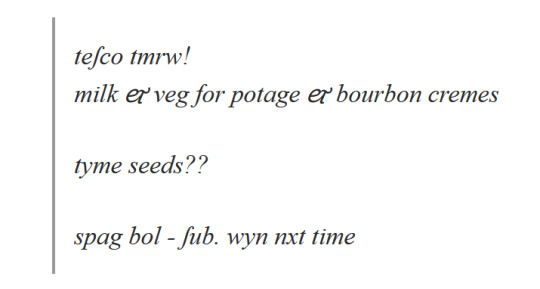
Eth used Cantonese, Simplified Chinese characters (a 20th century addition, faster to write, that Hob definitely would've embraced), variant character forms (which typically have a visual resemblance to each other), and 通假字, homophone characters that were conventionally used interchangeably with one another in Classical Chinese:
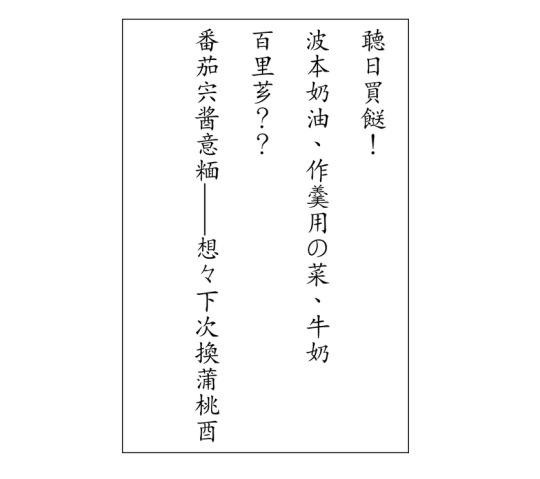
English and Chinese have such different writing systems and histories, and Eth has used all the compounding effects of that (upon things like phonology, modern-day intelligibility, writing system changes) to the absolute fullest effect and made choices that add invaluable implicit meaning to the story and characterization.
(As if that's not enough, the translation also features hot-linked footnotes that provide context for cultural references?! Literally everything a reader could ask for.)
And this is all super clever and fascinating if you're a big language fan like me, but the soft artichoke heart of my wonder can really be summed up best by this fact:
For many years I've loved the Jack Gilbert poem 'The Forgotten Dialect of the Heart', enough to put the first lines at the beginning of the fic:
How astonishing it is that language can almost mean, and frightening that it does not quite. Love, we say, God, we say, Rome and Michiko we write, and the words Get it wrong.
And for just as many years, I assumed Michiko was a place name, or some classical reference to art or literature beyond my plebby ken - until I saw Eth's note in the translation document.
Michiko, in fact, was the name of his wife.
The whole thing is such a testament to translation: the true deliberate practice of it, not just figurative language imagining a fictional character and his long-lived idiolect. And Eth's translation has only underlined my conviction that there is, sometimes, I feel, deeper work of understanding done - greater art made - and lovelier agonies to be had - in carrying words across languages than there is in putting the words down in the first place, in a first language.
#the death of translation#TRANSLATED!!!!#it must be said i meant only to link the translation but the moment i began to describe what eth has done i absolutely could not stop#it's BRILLIANT#the sandman#dreamling#an essay#language i love thee so
57 notes
·
View notes
Text
Mary loved romance. She hadn't been good in relationships. She was into bad boys who used her or she had hurt good boys instead. Like James Potter for example. Any girl would dream to have boyfriend like him. He was caring, romantic, he made Mary feel so beautiful and important when she was with him. He compromised. James was a tragic romantic who dreamed about marriage and happy endings. But Mary wasn't like that. She liked James but she couldn’t feel what he had felt for her.
Lily, on the other hand, was perfect for someone like James. She dreamed about love and happy endings too. She ate romance novels daily. She was a girl meant for marriage and cheesy stuff like that. Even if Lily hated James, Mary secretly rooted for the both of them. They could make a good couple. Both of them were Mary's friends and she knew that.
So Mary smiled when she spotted James staring at Lily during class with eyes of pure affection. Lily didn't notice most of the time. She would never believe that the toreag of Potter would actually like her that much. But it was pretty obvious that James was head over heels for her.
When James realized he was caught staring, he blushed as Mary raised her eyebrows at him. James looked away embarrassed. Mary shook her head amused.
"A question, Lily..." Mary immediately said once the class was over. She sat on Lily's desk casually. She knew James and his friends were listening to their conversation. Especially James "Potentially, what would you like a bloke who is interested in you, to do for you to accept him?"
James was definitely curious now. He even silenced Peter who had been talking.
Lily frowned as she picked up her things.
"Why are you asking that, Mary?" Marlene asked curiously as she approached them.
Mary shrugged.
"I'll let you know that Lily has a lot of admirers..." Mary explained "I simply want to know what they have to do to win her heart. Because they had been asking"
Lily's cheeks went as red as her hair.
"That's not true, Mary"
"Who has been asking?" Marlene asked.
Mary simply smiled, and started playing with her nails.
"What can I say, Lily. You're pretty"
Lily shook her head as she stood up.
"Obviously there are prettier girls than me"
"Lily... Blokes fancy you" Marlene intervened "You are just intelligent enough to not pay attention to them. Because they are not worthy"
Lily sighed and hugged her book into her chest.
"People aren't romantic enough anymore" she said "Back when they wrote poems and letters to their loved one..." she took a big sigh "Those where other times"
See? That was exactly the kind of bullshit James liked. Mary remembered how she used to find little notes, lyrics and poems from James all the time. Sometimes she got tired of them.
"Lily..."
Someone behind Marlene said and the three girls jumped. Severus Snape was a little creep who appeared like that.
Marlene and Mary exchanged disgusted looks. But Lily seemed to adore him somehow.
"Hi Sev" she smiled.
"Are you coming to the Library with me?"
Honestly, he never said hello to neither of them. It was as if the only one that existed for him was Lily. He was rude.
"Lily was coming to the Common Room with us"
And Marlene couldn't even hide how much she didn't stand him.
Snape clenched his teeth as if he was disgusted by Marlene's presence.
"I am sorry, girls" Lily intervened without even noticing "I promised Sev we were doing the History essay together..." Lily looked apologetic. Severus seemed triumphant "See you later..."
"Bye Lily" Mary sighed.
"Bye Lily" Marlene added as she watched them go. Then she turned and made gagging noises.
Mary laughed.
"I hate that wanker" Marlene said, sitting next to Mary "He always wants Lily for himself"
"I know... And he smells like rotten lettuce for some reason I can't even explain" Mary added.
Marlene shivered.
"So..." she said, smiling "Who has been asking for Lily?"
Mary smirked.
"You know we have to approve whatever wanker who wants to approach our sweet girl"
Mary gestured to the corner where The Marauders were still chatting. James was longingly staring at the door where Lily and Severus had disappeared.
"James..." Marlene sneered "He doesn't give up, huh?"
Mary shook her head "Marly... I think he is properly in love with her... It is not just a crush"
Marlene glanced at James thinking.
"Are you over him, then?"
Mary remembered the times when Mary used to pine and pine for James Potter. She didn't talk with Lily about it because she hated James. So Mary told Marlene all about her crush.
But that was before.
"Totally over him, darling"
Marlene narrowed her eyes.
"Besides I can tell when people fancy each other..." Mary continued "James fancies Lily... And Lily has to fancy him back at some point"
"I doubt it"
"She will realize it soon" Mary said "Just like you will realize you are into Sirius Black"
Marlene laughed and hit Mary's arm. Mary smirked.
"Again with that subject!" she exclaimed "I don't fancy Sirius Black"
Mary winked "Whatever you say, Marly"
Marlene rolled her eyes.
********
The next day, Mary and Lily walked to class on their own because Marlene got late with practice. Lily found a nice notebook on her desk. With a little note that read: "For Lily. Poems as well as romance never die. These remind me of you".
"What is it?" Mary asked curiously.
Lily had a big smile on her face as she flickered through it.
"It is full of famous poems and romantic love lyrics..."
Mary bit her lip. She was happy that James was actually doing something nice and romantic instead of acting like a fool in front of her.
"Who gave it to you?" Mary asked casually.
"They didn't leave their name"
"Any ideas?"
"Was it you?"
Mary snorted "Why would it be me, love?"
"Because of our conversation yesterday.... You wanted to make me feel better"
Mary raised her hands "I swear it wasn't me"
That moment, they saw Snape came into the class as well. With books in hand.
"Hi Lily" he smiled.
"I also exist..." Mary murmured but she was ignored.
"Was it you, Sev?" Lily asked.
Severus raised an eyebrow.
"What?"
"Did you give me this notebook?" Lily asked "You're the kind of person who would sit down and search for poems"
Mary frowned, looking at Snape. It hadn't been him. It had been James. Mary had helped him.
Snape's eyes flickered to the notebook in Lily's arms. He took a second to answer.
"Yes..." he said "It was me..." he approached with a smile "I heard your conversation with your friends yesterday and I wanted to give you something you would like"
Mary was disappointed. It had been James' chance. But perhaps he wasn't as sensitive and romantic as Snape.
Lily looked down, biting her lip.
"You didn't have to do that to make me feel better, Sev"
"I didn't do it to make you feel better..." Severus answered "It is the romantic gesture you deserved..." then he blushed "As friends of course"
Lily smiled and gave Severus a hug.
"Thank you. I loved it"
Mary wanted to vomit but she just rolled her eyes. There was something fishy about him. Lily deserved better.
Severus' expression was of pure joy as he gave into the hug. Like he had been dreaming about it for years.
"Lily..."
Mary wanted to protest some way but before she could continue, voices approached the door.
The Marauders were always loud. But James was frozen when he saw the scene. He observed Severus and Lily's hug as if it was physically hurting him.
Mary saw how his eyes flickered to the notebook in Lily's hand as if he recognized it. And then he looked down in disappointment.
Wait... Was he the one behind this after all?
The other boys and Marlene who was with them, looked disgusted.
It was Sirius who spoke when he saw his best friend's sad expression.
"Careful Ginger... You are going to get grease all over you..."
"Disgusting" Marlene added in a whisper.
Severus broke away from the hug with hate eyes for Sirius and the others.
Lily was rolling hers.
"Look Marly..." Mary said, taking Lily's notebook into her hands and walking towards Marlene "Snape got all romantic and gave Lily this notebook full of poems... All friendly by the way"
"Mary!"
Both Snape and Lily were blushing. But Mary wanted to prove something.
"Wow" Marlene said sarcastically with disgust.
"But.... But that was..." Peter began.
But James interrupted him.
"Wow Snivellus... I wouldn't have pictured you as a poet" James teased "Hope there's nothing erotic there about how you use your hair grease instead of lotion to wank"
The Marauders giggled except for Marlene who groaned saying: "Eew!"
Even Mary smiled. It had been funny. And it was pretty obvious her theory was correct. It had been James who wrote those poems.
But Snape looked miserable and embarrassed next to Lily.
"Shut up, Potter!" Lily snapped "You wouldn't understand a thing about literature!"
"They call me an expert, Evans" James crossed his arms, clearly offended. Then he cleared his throat "Roses are red..."
"Violets are blue..." Sirius added.
"Snivellus had a greasy hair..."
"And he needs to get shampoo..."
James and Sirius laughed hitting palms. The rest smiled amused.
Except for Lily who was furious.
"I just wanted to do something nice for Lily, Potter" Severus spat "Something you do for friends. But I suppose you don't have friends..." he gave a disgusted look at Remus, Sirius and Peter "Only minions of freaks who follow you around..."
Sirius wanted to approach and hurt him. But James stopped him.
"You are such a girl, Snivy"
"I think Lupin is the expert in femininity..." Snape added with a voice full of venom. And Remus seemed uncomfortable "Isn't he surrounded by girls all the time?"
Mary didn't understand the implications behind Snape's comment. But Remus didn't seem to like it and the rest of the Marauders looked furious.
"You little piece of..."
"Don't, Sirius..." Remus grabbed him by the shoulders.
"Leave it Sev..." Lily shook her head "They are not worthy.... And leave Remus out of this. He has nothing to do with this"
Severus was still looking furiously at all of them.
"Let's go, shall we?"
"Lily!" Mary protested. Every time she took Snape's side. And they were her friends as well.
Lily looked guilty as she took Severus' arm, dragging him passed The Marauders through the door.
Lily didn't notice how Snape purposely pushed Remus as he walked away.
Why did he have against poor Remus?
"What a wanker!" Sirius yelled. Then he approached Remus "Are you okay, Moony?"
Remus nodded "Yeah"
"What the hell, Prongs?" Peter asked "Why didn't you say it was you?"
"What?" Marlene asked.
James was looking at the floor.
"Wormy... It was supposed to be a secret"
Mary smiled "Come on, James. It was pretty obvious it was you, darling"
James looked at her. He bit his lip embarrassed. He probably remembered what he used to do for Mary.
"What are you talking about?" Marlene asked.
"It was James who gave Lily the poems, right?"
"What?" Marlene gasped.
James shrugged.
"Prongs! We spent hours in the library searching for stupid silly poems and writing them in the stupid notebook for Snivellus to get the credit?" Sirius tutted.
"Why didn't you say anything?" Remus added.
James didn't answer. He was still looking at the floor.
"Wait... So it was you who gave her the poems and Snape took the credit?" Marlene asked with her eyes widened. Mary nodded answering for James "What a sneaky wanker!"
Everyone agreed. Sirius was shaking his head furiously.
"You should have said something!" Marlene added, pushing James' shoulder.
"I think it is better that she thinks it was Snivellus" James sighed.
"Why?" Mary asked.
"Because she hates me!" James snapped. Then he swallowed "She hates me. She would have never believed I would do something like that... And even if she believed it, she would never take something coming from me"
James rubbed his hair in frustration.
"Besides, I didn't search and copy those poems to receive anything in exchange... But because I knew she would like them.... I wanted to make her happy. That's all" he looked down "She would appreciate them more coming from Snivellus"
Mary concluded that what James felt for Lily was more than a simple crush. Past James would had done anything to gain Lily's attention. But now all he wanted was her happiness.
"So Snape is a bloody liar" Mary tutted.
"It's not fair!" Marlene added.
James turned to them.
"And you two..." he pointed at them "Don't you dare tell her the truth!"
Mary and Marlene looked between each other. They had to tell Lily, right?
"Honestly mate...." Sirius put his hand on James' shoulder "That girl is not worth the effort"
"Watch it, Black!" Marlene snapped "Lily is our friend"
"And she is worth it, Pads" James added "I would do anything to make her happy"
"Prongs..." Remus smiled "Just say things like that in front of her and she would definitely see you differently"
"Yes!" Mary couldn't agree more.
"Instead of acting like an idiot around her" Marlene added.
James looked between them.
"Just... Don't say anything please..." he hissed.
"But..."
"Please!" James shouted "Promise it!"
Mary didn't think it was fair. Lily kept complaining that none one liked her enough. She dreamed about a prince charming and here he was, right in front of her. James would make Lily happy. Mary was sure of it. They deserved each other.
"Okay... We promise"
"Thank you, Mary" James smiled.
Maybe Mary was going to keep her promise about the poems but she had to do something to pair James and Lily up. She had to make her realize that James was not bad at all. And that he really loved her.
#marauders#maraudersera#muggleau#mary mcdonald#james potter#lily evans#jily#remus lupin#sirius black#peter pettigrew#anti severus snape#flowerpott
32 notes
·
View notes
Note
"These aren't bad lyrics you just took them out of context 😭😭😭😭" and then the context just makes it worse. I can't handle it. The line could be "the sky is blue" and the full context is "I looked at the sky/ the sky is blue/I saw the sky/ it was a color/ bl-UUUE" like it's still trash. Now it's long winded trash. There is no difference in the 2 messages there's nothing to clarify. Like, I hated English but I did well and her lyrics are so generic. They sound like she got a 9th grade assignment prompt. "Write a short story containing a keychain, a car, and a fork" "write a rhyming poem about your summer" it's all so juvenile. Anybody can put a few deepish lines in their essays every once in a while. It'll still be a c+ essay if you're talking in circles until you hit the word count. She's a C student who doesn't take the notes then complains that the teacher is out to get her.
That’s the word! The lyric is juvenile. Taylor Swift demonstrates she does not understand how racism works not only then but now.
Chattel slavery was an economic system built upon the kidnapping and exploitation of west Africans. Reducing anyone who participated in this economic system (enslaved Africans did not participate, they were exploited and abused) to simply “racist” is an injustice to enslaved Africans. It dismisses the violence slave traders, masters, auctioneers and more committed as a microagression rather than participating in a violent economic system rooted in the dehumanization of Africans.
You cannot remove chattel slavery from the 1830s, like how you cannot remove the Trail of Tears, like how you cannot remove the Gold Rush. These historical processes shaped daily life during this era she’s choosing to romanticize.
So yeah, the lyric was juvenile at best and bait at worst to get people talking about her album. Whether her ignorance in the line is deliberate or not, she relies on bait like this in her music to disguise its her underwhelming and below average songwriting.
#anti taylor swift#ask#notyouraryang0dd3ss#anon#i have no idea why the fuck i went on that tangent. hope that helps explain why that lyric is so stupid#ts: racism#the tortured poets department#ts: music#ts: songwriting#fave
17 notes
·
View notes